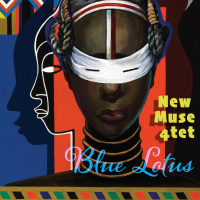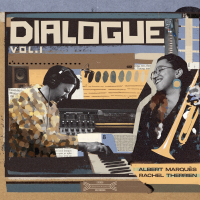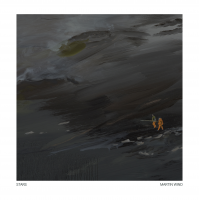Home » Jazz Articles » Album Review » The New Muse 4Tet: Blue Lotus
The New Muse 4Tet: Blue Lotus
Blue Lotus touches America's splintered society profoundly. The title piece is gripping modern classical music, a network of highly listenable, deftly arranged harmonic liberation. Alex Waterman's cello plays an insistent bass line against the chordal clouds of violinists Laster and Hsinwei Chiang and violist Melanie Dyer, a frequent collaborator of the leader's. Once the work breaks free, it speaks with a passion recalling Chopin Romanticism before a moving, blue Laster violin solo moans and whispers. Dyer's viola comes alive in the second piece, "Awakenings," darkly resounding, and "City Echoes" opens with anguished solo statement by Waterman. This piece also features the propulsive tabla drums of Ehren Hansen.
The album's centerpiece, however, is the "Black Lives Matter Suite." The first movement, "Cigarette," was inspired by the Sandra Bland tragedy, written by Laster over several days almost as a score to the news reports frantically pursuing her. The primary theme and its development are appropriately haunting in their blend of the familiar and far distant. In fact, the piece's evocative arc of melody, extended harmonies and rhythmic attack are reminiscent of Bernard Herrmann's film scores. It's clear that this was a singularly personal work for Laster: in a recent interview she spoke of her frightening experience shortly after the Bland incident, when she was pulled over by a local cop in New York's Hudson Valley, and made to feel like a criminal as she was left in the back seat of a police cruiser. The heat rising along with anxiety, Laster states that she nearly passed out while awaiting release; drenched with perspiration she was finally let out and proceeded home, terribly shaken. "I could have been killed," she said, mired in the discomfort of the memory. "As I sat back there, I realized just how fragile the situation was."
Laster was compelled by this indignity to complete her "Black Lives Matter Suite." The quartet paints an alternately lush and spiky tapestry that, without even the allusion of a rhythm section, swings, swoops, tears, strikes and shreds the airspace across each movement. The piece goes beyond the Bland killing, offering "Three to Eleven," a stirring commemoration of Samuel Harrell, a non-violent drug offender terminally beaten by Fishkill Corrections Officers; none were charged with the crime though the Medical Examiner ruled the death a homicide. And the suite closes with something of a pocket masterwork, "Entrapped," a collaboration with spoken word artist/activist Poet Gold. It tells the intertwined story of the Newburgh 4, accused of a terrorist plot several years ago. Laster's music is built around a terse, insistent tango of modal reach through which the four instrumentalists leap and emote over both score and improvisations guided by the reading of Gold, her rich voice a somber reflection of the need for change which lies ahead.
"Born into a system of injustice that existed long before they got here...to place hope behind steel bars that don't bend with windows without a view, dimming the light, the fight, the might..."
Track Listing
Blue Lotus; Awakening; City Echos; Movement 1 - Cigarette; Movement 2 - Three to Eleven - Movement 3 - Entrapped
Personnel
Gwen Laster
violinHsinwei Chiang
violinMelanie Dyer
violaAlex Waterman
celloEhren Hansen
tablasPoet Gold
poet / spoken wordAlbum information
Title: Blue Lotus | Year Released: 2021 | Record Label: Self Released
Tags
PREVIOUS / NEXT
Support All About Jazz
 All About Jazz has been a pillar of jazz since 1995, championing it as an art form and, more importantly, supporting the musicians who make it. Our enduring commitment has made "AAJ" one of the most culturally important websites of its kind, read by hundreds of thousands of fans, musicians and industry figures every month.
All About Jazz has been a pillar of jazz since 1995, championing it as an art form and, more importantly, supporting the musicians who make it. Our enduring commitment has made "AAJ" one of the most culturally important websites of its kind, read by hundreds of thousands of fans, musicians and industry figures every month.























